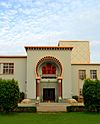Ross Masood
Ross Masood | |
|---|---|
 | |
| Born | 15 February 1889 |
| Died | 30 July 1937 (aged 48) |
| Parent(s) |
|
| Relatives | Syed Ahmed Khan (grandfather) |
| Part of a series on |
| Aligarh Movement |
|---|
 |
Syed Sir Ross Masood bin Mahmood Khan (15 February 1889 – 30 July 1937), was the Vice-Chancellor of Aligarh Muslim University starting in 1929.[1][2]
Early life and career[edit | edit source]
Ross Masood was the son of Syed Mahmood. His grandfather was Sir Syed Ahmed Khan.[2] He had three children: one daughter, Nadira Begum, and two sons, Anwar Masood and Akbar Masood (1917–1971). Ross Masood was educated at Aligarh Muslim University and the University of Oxford.[3]
On his return from England, Masood was elected a trustee of Muhammadan Anglo-Oriental College and started his own legal practice in Patna. He then entered the Indian Education Service as headmaster of the Patna High School, a professor at Ravenshaw College, Cuttack (Orissa), and one of the founders of Osmania University.[3]
From 1916 to 1928, he was Director of Public Instruction in Hyderabad Deccan. He became the Vice-Chancellor of Aligarh Muslim University in 1929. He was knighted by the British Government in the 1933 Birthday Honours list.[1] Here, he introduced new courses, upgraded the syllabi and established laboratories for various science subjects.[4]
Anjuman Taraqqi-i-Urdu published a biography of Masud in 2011.[5] He was the president of Anjuman Taraqqi-i-Urdu.[6]
A residential hall constructed in the year 1969 in Aligarh Muslim University is named after him.
Ross Masood was linked to the British novelist E. M. Forster. Forster's novel A Passage to India (1924) is dedicated to Masood.[7][8]
References[edit | edit source]
- ↑ 1.0 1.1 Ross Masood on The London Gazette Published 6 June 1933, Retrieved 9 October 2019
- ↑ 2.0 2.1 Peerzada Salman (28 April 2014). "This week 50 years ago: Tributes paid to Ross Masood". Dawn (newspaper). Retrieved 9 October 2019.
- ↑ 3.0 3.1 Syed Ross Masood - Pursuit of Excellence in Higher Education on aligarhmovement.com website Retrieved 11 October 2019
- ↑ Matai-e Garan Baha Masood by Hakim Syed Zillur Rahman, Souvenir Federation of Aligarh Muslim University Alumni Association of North America, USA, 2003
- ↑ Hakim Syed Zillur Rahman (2011), Rās Masʻūd, Naʼī Dihlī: Anjuman Taraqqī-yi Urdū (Hind), ISBN 978-8171601608, OL 25056019M, 817160160X
- ↑ "Ross Masud – Bahaisiyat Sadr-e Anjuman Tarraqi-e-Urdu" by Hakim Syed Zillur Rahman, Hundredth Anniversary of Anjuman Tarraqi-e-Urdu Hind, New Delhi, 28 February – 2 March 2003
- ↑ Scheherazade Alim (9 April 2001). "Forster Chacha: A Personal Reminiscence (of Ross Masood)". Outlook magazine website. Retrieved 9 October 2019.
- ↑ Forster-Masood letters / edited by Jalil Ahmad Kidwai. Karachi, Pakistan : Ross Masood Education and Culture Society of Pakistan, 1984.
External links[edit | edit source]
| Academic offices | ||
|---|---|---|
| Preceded by Shah Muhammad Sulaiman |
Vice-Chancellor of AMU 1929 |
Succeeded by Nawab Mohammad Ismail Khan |
